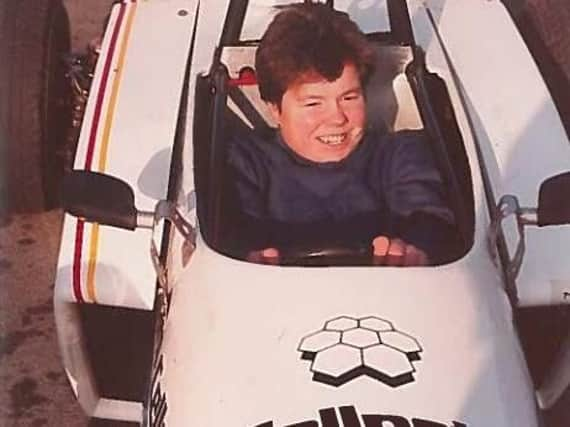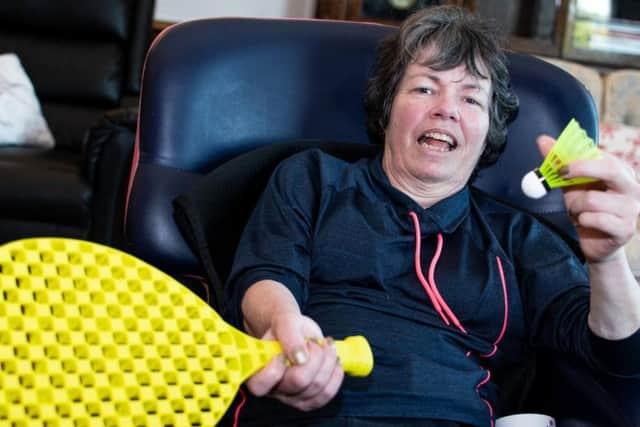Join our £1million Sponsor a Star campaign - 'wheelchair tennis brings me alive again'


Accepting her body’s limitations has been a tough journey. In Nicola Hopkins’ working life, she was a successful career woman and avid sportswoman.
“I wish I could go back to what I was,” she says. “I wish I could do all the activities that I used to be able to do.”


Advertisement
Hide AdAdvertisement
Hide AdNicola had been a police officer for the Ministry of Defence, did a daredevil parachute jump and has travelled round the Philippines on her own.
So getting her head around what was happening to her body has taken her to some dark places.
“I thought my time was up in 2011,” the 54-year-old says. “I gave myself medicine. I just wanted to end my life then and there.
“But I climbed back up.
“Sometimes my head gets muddled, I think I can do things that I can’t do or used to do when I was younger.
Advertisement
Hide AdAdvertisement
Hide Ad“I do get down when I can’t do those things that I used to do.
“But I came alive when I started playing tennis on the wheelchair. That was good fun, When I play tennis they say, ‘You play like you’ve done this before.’”
By Sponsoring a Star and donating money to buy an anti-gravity treadmill for the new Sue Ryder specialist neurological care centre in Fulwood, wellwishers could be helping to enhance Nicola’s life, helping her to find a way to enjoy some of the things that she used to.
Centre director Terry Mears says one of the items on the Christmas wish list for the new centre is an anti-gravity treadmill.
“We’ve looked at anti-gravity running machines,” he says.
Advertisement
Hide AdAdvertisement
Hide Ad“It would mean that people who don’t have any mobility and won’t get that back can still experience standing up and the motion of running or walking within this machine.
“If you go to the gym and you’ve seen the treadmills - it’s just like that - but there’s a huge balloon round the runner.
“The person is hoisted in and it creates a negative gravity so that they are weightless.
“It means they can actually have that experience.”
He adds: “It’s how we create an opportunity, however limited it may sound, for that person to still have some fulfilment of those wishes, those dreams, those ambitions.”
Advertisement
Hide AdAdvertisement
Hide AdAsked if she thinks she would enjoy the treadmill Nicola says: “I’m open for anything that improves my standard of living or if it means I can keep doing some of the things I used to do.”
Nicola has left no stone unturned in playing sports. A keen golfer, she had a handicap of 18. She won £150 once playing tenpin bowling. A feisty player, she was kicked out of a rugby game for tripping up another player. She loved driving. She once undertook a 20 mile walk in a day and she’s been to see numerous Formula Ford races.
Now playing a bit of tennis from her wheelchair is one of the activities she enjoys. With the hydrotherapy pool and anti-gravity treadmill, Nicola could maybe even look forward to being able to try out other sports.
Nicola’s brother Andrew Pinches, 56, welcomes anything that will mean Nicola can enjoy her life more.
Advertisement
Hide AdAdvertisement
Hide AdHe says: “The MS has taken its toll now. It was so rapid. It was the speed of the downward spiral that was really upsetting.
“Nicola is a strong-willed woman. She’s got a cracking sense of humour and she’s kept that all the way through.
“I think the staff at Sue Ryder are helping her to look forward to what she can do.”
Terry says that despite people’s conditions they still want to enjoy what they were once able to.
Advertisement
Hide AdAdvertisement
Hide Ad“We’ve got one resident who’s been to the Commonwealth Games,” he says. “That ambition, that desire to compete doesn’t stop.”
HOW TO DONATE
Readers are welcome to donate any amount to the appeal. Anyone who donates £10 or above will have their names included in our Sponsor a Star article in the paper, just before Christmas.
To donate, go to www.sueryder.org/makeadonationOr send a cheque to:
Lancashire Post Appeal,
Supporter Care,
Sue Ryder,
183 Eversholt Street,
London NW1 1BU
WHAT IS MS?
Multiple sclerosis (MS) is a condition that can affect the brain and spinal cord, causing a wide range of potential symptoms, including problems with vision, arm or leg movement, sensation or balance.
Advertisement
Hide AdAdvertisement
Hide AdIt’s a lifelong condition that can sometimes cause serious disability, although it can occasionally be mild.
In many cases, it’s possible to treat symptoms. Average life expectancy is slightly reduced for people with MS.
It’s most commonly diagnosed in people in their 20s and 30s, although it can develop at any age. It’s about two to three times more common in women than men.
MS is one of the most common causes of disability in younger adults.
Advertisement
Hide AdAdvertisement
Hide AdThe symptoms of MS vary widely from person to person and can affect any part of the body.
The main symptoms include:
• fatigue
• difficulty walking
• vision problems, such as blurred vision
• problems controlling the bladder
• numbness or tingling in different parts of the body
• muscle stiffness and spasms
• problems with balance and co-ordination
• problems with thinking, learning and planning
Depending on the type of MS you have, symptoms may come and go in phases or get steadily worse over time.